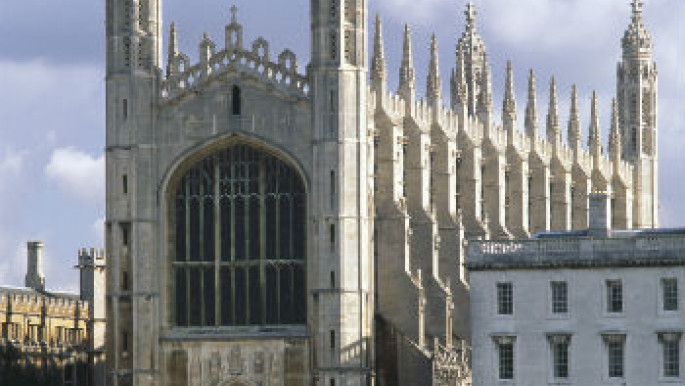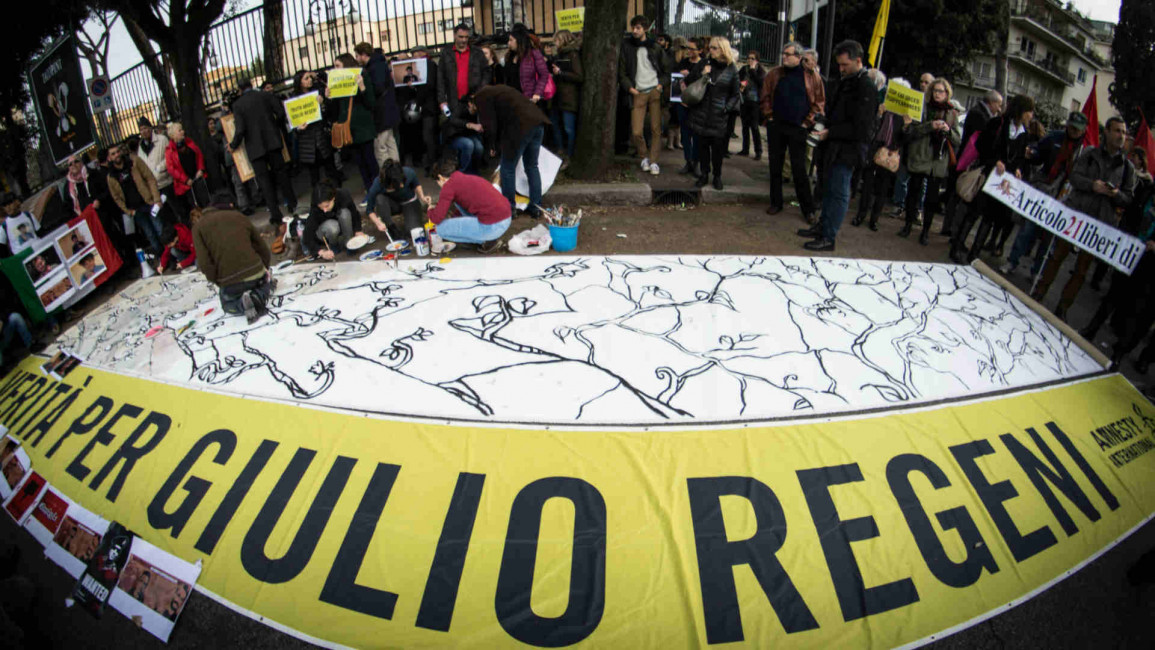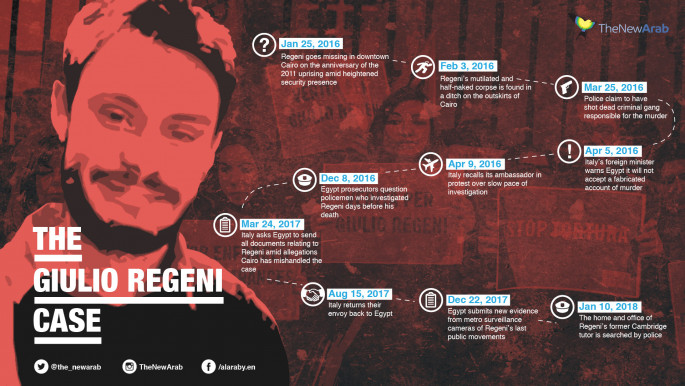Giulio Regeni: Cambridge tutor's computer seized for investigation
Giulio Regeni: Cambridge tutor's computer seized for investigation
Italian authorities shift focus of investigation from Cairo to Cambridge, as they question Regeni's tutor over his motivations to study the sensitive topic of labour unions for his PhD.
3 min read
Two years on, frustration prevails over investigators' lack of answers to Regeni's killing [Getty]
Italian police investigating the murder of Italian PhD student Giulio Regeni, who was found tortured and killed in Cairo two years ago, have seized the computer, mobile phone and some documents belonging his Cambridge University tutor, it has been reported by Reuters.
There is no suggestion that Regeni's tutor, Maha Abdulrahman, was involved in the student's death. However, she has become a continuing focus of the investigation after being initially reluctant to assist in the Italian-led probe.
Dr Abdulrahman, herself from Egypt, finally agreed to be questioned in Cambridge on Tuesday, prosecutors said. The Italian magistrates leading the investigation, along with a team from the British authorities, visited Abdulrahman's home and office on Wednesday, where they took her computer, mobile phone, hard drive, USB drive, and some unspecified documents.
Dr Abdulrahman has refused on two separate occasions to be interviewed by investigators, who have reportedly been trying to question her over why Regeni had chosen his research subject, and if there was any chance she had put him in harm's way.
Twenty-eight-year-old Regeni was undertaking research on Egyptian labour unions, a sensitive topic in the authoritarian state.
"[This] will be useful to bring definitive clarity, in an unequivocal and objective way, to the role of the tutor in consideration of the investigation," the prosecutors said in a statement.
Cambridge University has increasingly become a target of the Italian-led investigation, with authorities wanting to know if Regeni was ever put under pressure to pursue such a politically-sensitive topic, and also, whether the university should have done more to safeguard him during his field research.
However, suspicions have been raised over the shifting focus of the investigation, from Cairo to Cambridge, leading some to question whether the investigators have come under political pressure to do so.
In August 2017, Italy came under fierce criticism for resuming its diplomatic mission in Cairo, 15 months after withdrawing its ambassador amid anger over the Egyptian authorities' lack of cooperation with the murder investigation.
It has also been reported that Dr Abdulrahman was deeply shaken by her student's death, having taken a leave of absence in the wake of the murder, as well as attending his funeral in Italy in 2016. It has been speculated that she therefore had anxieties about official questioning.
Last month, Egyptian authorities submitted new evidence to the investigation, constituting recordings from metro stations in Cairo.
It is understood that Regeni was arrested while taking the Cairo metro on January 25, 2016, the fifth anniversary of the 2011 revolution. Egyptian security is known to have been bolstered on this occasion for fear of the slightest unrest or repeat protests.
There is no suggestion that Regeni's tutor, Maha Abdulrahman, was involved in the student's death. However, she has become a continuing focus of the investigation after being initially reluctant to assist in the Italian-led probe.
Dr Abdulrahman, herself from Egypt, finally agreed to be questioned in Cambridge on Tuesday, prosecutors said. The Italian magistrates leading the investigation, along with a team from the British authorities, visited Abdulrahman's home and office on Wednesday, where they took her computer, mobile phone, hard drive, USB drive, and some unspecified documents.
Dr Abdulrahman has refused on two separate occasions to be interviewed by investigators, who have reportedly been trying to question her over why Regeni had chosen his research subject, and if there was any chance she had put him in harm's way.
Twenty-eight-year-old Regeni was undertaking research on Egyptian labour unions, a sensitive topic in the authoritarian state.
"[This] will be useful to bring definitive clarity, in an unequivocal and objective way, to the role of the tutor in consideration of the investigation," the prosecutors said in a statement.
Cambridge University has increasingly become a target of the Italian-led investigation, with authorities wanting to know if Regeni was ever put under pressure to pursue such a politically-sensitive topic, and also, whether the university should have done more to safeguard him during his field research.
 |
|
| Cambridge University has increasingly become a target of the Italian-led investigation, with authorities wanting to know whether the institution did enough to safeguard Regeni during his research of a politically-sensitive subject [Getty] |
However, suspicions have been raised over the shifting focus of the investigation, from Cairo to Cambridge, leading some to question whether the investigators have come under political pressure to do so.
In August 2017, Italy came under fierce criticism for resuming its diplomatic mission in Cairo, 15 months after withdrawing its ambassador amid anger over the Egyptian authorities' lack of cooperation with the murder investigation.
It has also been reported that Dr Abdulrahman was deeply shaken by her student's death, having taken a leave of absence in the wake of the murder, as well as attending his funeral in Italy in 2016. It has been speculated that she therefore had anxieties about official questioning.
Last month, Egyptian authorities submitted new evidence to the investigation, constituting recordings from metro stations in Cairo.
It is understood that Regeni was arrested while taking the Cairo metro on January 25, 2016, the fifth anniversary of the 2011 revolution. Egyptian security is known to have been bolstered on this occasion for fear of the slightest unrest or repeat protests.
In January, Egypt finally authorised Italy to send experts to examine footage from surveillance cameras at a Cairo metro station to shed light on Regeni's final public movements before his disappearance.
Regeni's body was found by a roadside outside of Cairo, more than a week after his disappearance. His body bore torture marks synonymous with practices employed by the Egyptian secret police, who are known to surveil and kidnap dissidents and political opponents, including students.
Since the beginning of the investigation, Egypt has faced accusations that a member of its security services commited the murder, but Cairo has denied these claims.
The Regeni family's legal advisor, Ibrahim Metwally, was arrested and detained for 15 days by Egyptian authorities in September, adding fuel to the raging furore over their handling of the investigation, as well as their shoddy human rights record amid the post-Arab spring crackdown on dissent and freedoms.


![President Pezeshkian has denounced Israel's attacks on Lebanon [Getty]](/sites/default/files/styles/image_684x385/public/2173482924.jpeg?h=a5f2f23a&itok=q3evVtko)



 Follow the Middle East's top stories in English at The New Arab on Google News
Follow the Middle East's top stories in English at The New Arab on Google News


